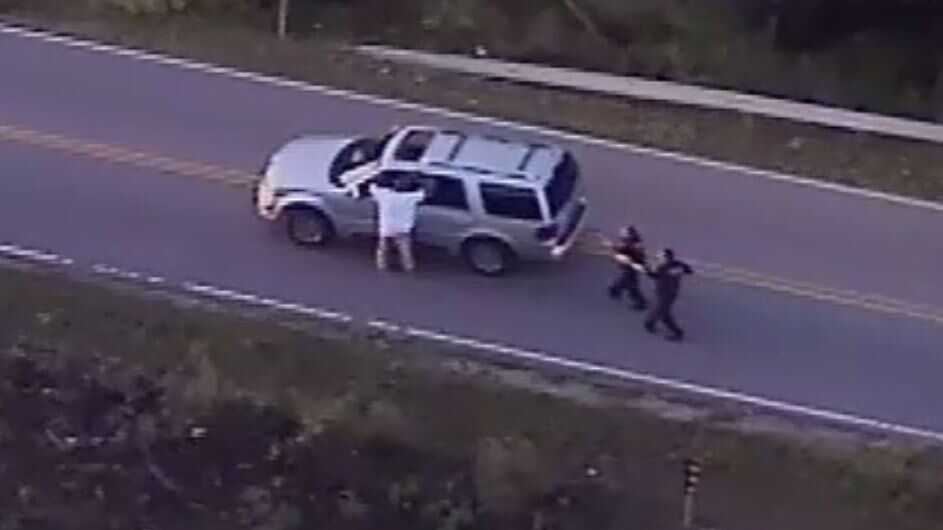States
The Killing Of Terence Crutcher And The Fight For Racial Justice

Terence Crutcher 40 a Black man was another victim of police brutality on September 16 2016. His tragic encounter with police officers in Tulsa Oklahoma sparked anger and prompted cries for justice against systematic racism.
Police responded to a complaint of an abandoned car blocking traffic on a typical evening. A deadly altercation left Crutcher dead his family grieving and a community seeking responsibility.
His twin sister said Crutcher a loving parent and churchgoer was in the wrong place at the wrong time. Officer Betty Jo Shelby came as he stood beside his immobilized car. Shelby fired at Crutcher who was unarmed and not a danger.
Law officials said Crutcher reached inside his car despite instructions to halt. Eyewitness testimonies and later investigations revealed contradictions and questioned the basis for fatal action.
After Crutcher death the community protested police violence against Black men. The call for justice resonated as law enforcement struggled with prejudice.
Shelby was charged with first degree manslaughter which offered hope for accountability. Shelby acquittal was a painful blow to justice seekers. The verdict highlighted the difficulties of bringing law enforcement responsible especially for racial prejudice.
The assassination of Terence Crutcher exposed America deep rooted prejudice and police brutality. It was a sign of systemic failings that disproportionately affect communities of color. Crutcher killing continued a terrible legacy of Black lives lost to a flawed judicial system.
Authorities notably the Department of Justice gave little comfort to Crutcher family and community. Racial prejudice and impunity perpetuate violence and injustice despite promises of investigations and improvements.
The push for change became stronger after Crutcher murder. Advocates and activists sought accountability bias training and community supervision to remove police enforcement prejudice. Entangled interests oppose significant change making it complicated.
After the judicial procedures Terence Crutcher symbolized the fight for racial justice. His name joined the ranks of many others who have fallen prey to bigotry a sobering reminder of the work still needed to achieve equality and human rights.
Terence Crutcher legacy inspires change and optimism in Tulsa and beyond. Despite his needless death his legacy inspires a movement that won’t be hushed until justice is done and prejudice is destroyed.
Continued Community Outrage
After Terence Crutcher murder community uproar echoed across calling for accountability and institutional change. His killing sparked a national discourse about police brutality against Black people outside Tulsa.
Street protesters chanted and held Crutcher branded banners. They expressed the concerns of decades of oppressed communities who have experienced criminal justice system racial injustice. Activists and supporters repeated the Black Lives Matter demand to halt violence and impunity.
The demonstrations showed justice fighters’ tenacity. Despite pushback and persecution protestors remained committed to holding law enforcement responsible and eradicating racism that perpetuates inequality and injustice.
Read Also: Jesse White’s Retirement Unveils The Racial Challenges That Shaped His Illustrious Career
The hashtag JusticeForTerenceCrutcher trended internationally as campaigning and awareness battled on social media. Sharing information organizing demonstrations and amplifying underrepresented voices on the internet mobilized support for racial justice.
Community leaders and organizations demanded changes alongside public demonstrations. Policymakers faced pressure to address structural flaws that cause police brutality prompting calls for police accountability measures including body cams civilian oversight boards and implicit bias training.
Terence Crutcher murder inspired a broad coalition of activists campaigners and people to fight for justice. While the path ahead is long and complex the community tenacity and persistent devotion provide hope for a future without racism and police violence.
Legal And Political Effects In Terence Crutcher murder
The legal and political repercussions of Terence Crutcher murder shaped national policy discussions. The case prompted extensive law enforcement investigation and criminal justice accountability requests.
The Officer Betty Jo Shelby trial revealed the difficulties of prosecuting police abuse crimes. Despite solid evidence and passionate prosecution Shelby was acquitted highlighting the challenges of convicting law enforcement officials.
The judgment angered Crutcher family and friends who saw it as a miscarriage of justice. Many questioned the court system fairness and impartiality especially its capacity to hold police responsible. The acquittal highlighted the criminal justice system chronic racism and inequality.
The murder of Crutcher sparked police reform and racial equality issues in politics. Lawmakers felt pressed to make serious reforms to address Crutcher death root causes. Police reform including improved training monitoring and accountability gained popularity as officials worked to rebuild public faith in law enforcement.
The Department of Justice decision not to file civil rights charges highlighted the difficulty of holding police enforcement responsible for constitutional infractions. Federal investigations promised justice but existing laws and legal norms hindered accountability.
Despite failures Terence Crutcher murder continues to inspire systemic reform. His killing sparked a national campaign for racial justice demanding criminal justice responsibility openness and equality. The legacy of Terence Crutcher reminds us of the continuous battle for racial equality and human rights in America.













You must be logged in to post a comment Login